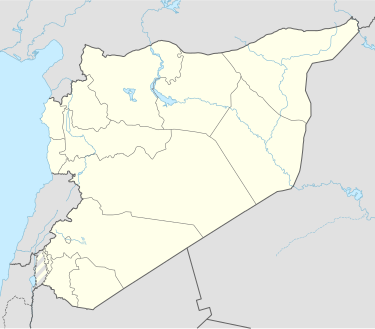Aqir Zayti
Aqir Zayti
عقر زيتي Aqir Zeit | |
|---|---|
Village | |
| Coordinates: 34°57′43″N 36°0′23″E / 34.96194°N 36.00639°E | |
| Country | |
| Governorate | Tartus |
| District | Tartus |
| Subdistrict | al-Sawda |
| Population (2004) | |
• Total | 783 |
| Time zone | UTC+2 (EET) |
| • Summer (DST) | UTC+3 (EEST) |
| City Qrya Pcode | C3409 |
Aqir Zayti (Arabic: عقر زيتي, also spelled Aqir Zayt or Aqir Zeit) is a village in northwestern Syria, administratively part of the Tartus Governorate, located in the Syrian Coastal Mountain Range, east of Tartus. The village of Khirbet al-Faras is located immediately south. According to the Syria Central Bureau of Statistics (CBS), Aqir Zayti had a population of 783 in the 2004 census.[1] Its inhabitants are predominantly Ismailis, who moved there after being forced out from the nearby fortress village of Khawabi in the early 20th century.[2]
Aqir Zayti contains the al-Hajj Khidr Tomb, an important Ismaili shrine. According to local Ismaili legend, which is partly rooted in historical facts, al-Hajj Khidr was an Ismaili religious sheikh from al-Qadmus who became popular in that area and was consequently forced out by that town's Ismaili emirs. Al-Hajj Khidr later represented the Ismaili community of Khawabi, where he and his supporters took refuge, on a delegation to meet the chief imam of the Ismailis in India. The imam in India assigned al-Hajj Khidr to become the chief missionary of Syria, replacing the aging Muhammad al-Suwaydani. Upon returning to Syria, al-Hajj Khidr's authority was rejected by the Ismaili emirs of al-Qadmus, Masyaf and Wadi al-Uyun. The two sides later clashed and al-Hajj Khidr and many of his partisans were killed.[3] Due to reforms by Aga Khan III which forbade shrine worship, al-Hajj Khidr's shrine was dismantled in the early 20th century.[4]
References
[edit]- ^ "General Census of Population 2004". Retrieved 2014-07-10.
- ^ Boulanger, 1966, p. 443.
- ^ Douwes, ed. Daftary 2011, pp. 24-25.
- ^ Douwes, ed. Daftary 2011, p. 37.
Bibliography
[edit]- Boulanger, Robert, ed. (1966). The Middle East, Lebanon, Syria, Jordan, Iraq, Iran. Hachette.
- Douwes, Dick (2011). "Modern History of the Nizari Ismailis of Syria". In Farhad, Daftary (ed.). A Modern History of the Ismailis: Continuity and Change in a Muslim Community. I. B. Tauris. ISBN 9781845117177.

